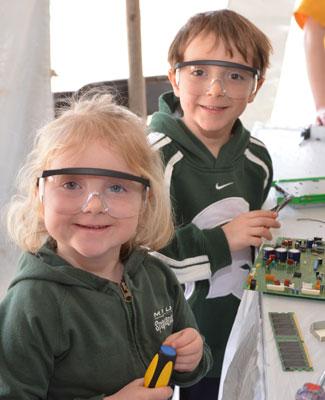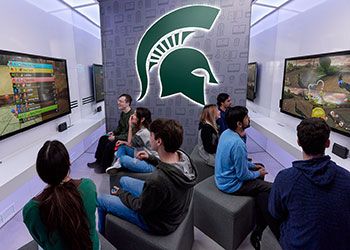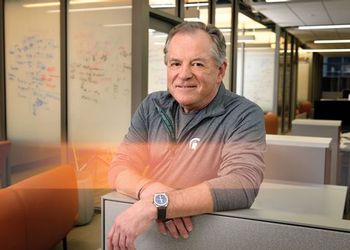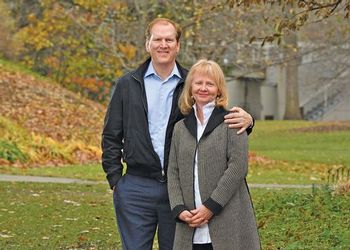STEM Success: Helping Students Achieve Their Dreams
STEM Success offers a fresh beginning to help students surmount shortcomings in their pre-college math and science education.

STEM Success: Helping Students Achieve Their Dreams
STEM Success offers a fresh beginning to help students surmount shortcomings in their pre-college math and science education.
February 27, 2015A Michigan high school student dreams of a future designing the next generation of technology. Another has her heart set on a lifetime of discovery, probing the unsolved mysteries of chemistry. Both are talented; both are ambitious; both score well on their college entrance exams. But, due to the quality of their high school math and science preparation, they struggle in their first year of college to compete in these areas. This struggle to keep pace can cause them to abandon their career goals entirely.
“Employers and educators agree that preparing students to be leaders in science and technology is a priority,” said Mike Whiting, Jr., president of The Herbert H. and Grace A. Dow Foundation. “It’s an economic imperative to strengthen and expand STEM education for students in Michigan.”
To build on its record of support for education in science, technology, engineering and mathematics, the Herbert H. and Grace A. Dow Foundation has made a grant to launch Michigan State University’s STEM Success program to give students in these disciplines the fundamental knowledge they need to earn degrees.
Whiting added, “The foundation was made possible because of innovations in science and technology. We are proud to help launch a new program that will draw upon Michigan State’s leadership in STEM education and help more students prepare for careers in the essential STEM professions.”
STEM Success offers a fresh beginning to help students surmount shortcomings in their pre-college math and science education. Building on the success of existing MSU programs, eligible students will enroll in a pre-freshman summer math course to prepare for college algebra in the fall. The Math Bridge Program uses a hybrid format with both on- and off-campus classes, phone and video support and online programming to reach all eligible students. A summer 2013 pilot program in the Detroit area resulted in a majority of students who completed the course passing college algebra in their first freshman semester.
A new course, Explorations in Chemistry, will be offered to STEM Success Scholars taking college algebra. Students will engage in science practices and gain the foundational conceptual knowledge of value to all STEM majors. They will then be prepared to succeed in the traditional chemistry introductory course and subsequent STEM classes.
MSU’s innovative Neighborhood system provides services convenient to where students live. STEM Success scholars will be clustered in two of the five campus Neighborhoods to take advantage of concentrated professional support and to foster a peer community. Support from the Dow Foundation will fund Neighborhood professional advisors and peer mentors to work with the 300 STEM Success students enrolled each year.
“We are grateful to the Herbert H. and Grace A. Dow Foundation for its partnership and its endorsement of the considerable work already done at MSU around expanding opportunities in STEM-related disciplines,” said MSU Provost June Youatt. “We appreciate its investment in our work and our students, and we share optimism about what this can mean for the students, their communities and the state of Michigan.”
MSU’s Midland Research Institute for Value Chain Creation will host STEM Success scholars and provide speakers on campus. Some scholars will assist with research and shadow medical students at MSU’s medical campuses in Midland and around the state in the summer term.
Half of the $5M grant will fund the program’s first three years. The rest is endowed to enable future STEM Success scholars to participate in undergraduate research and as peer mentors.
STEM success begins early
Children want to know! Why is this happening? How is this made? How does this work? What if we try to do this differently? These are questions future scientists, future engineers, future computational experts, and future explorers of the unknown would ask.
Every MSU college reaches out to Michigan’s K-12 students, but in the STEM disciplines our efforts have been particularly aggressive. In STEM alone, there are more than 35 Spartan Youth programs. Whether it’s about robotics, math, environmental science, or unique learning experiences at Abrams Planetarium or the MSU Cyclotron, each program aims to engage youthful curiosity and encourage young people to have confidence that, if they choose, they can grow up to be engineers, scientists, doctors, college professors — discoverers. Why not?
MSU students in Science Theatre visit classrooms around the state. Presentations are interactive and inspire children to see science as exciting and fun through demonstrations with names like Outrageous Ooze, Non-Burning Money, Bed of Nails and Tornado Bottles. The MSU students leave descriptions of age-appropriate experiments for the teacher and class to try during the school year.
Michigan Science Olympiad has been held at MSU for 24 years. Nearly 100 teams of secondary students design and build machines, analyze a ‘crime scene’ or are presented with challenges (e.g., “drop a raw egg from a height without breakage”). MSU faculty and students are among the 300 volunteers each year.
Intro to Robotics Engineering at MSU: High school students spend five days on campus and learn about fields of engineering involving robotics. They work with NXDT and VEX robotics, biomimetic robotic fish, nanorobotics, mechantronics and manufacturing automation. This is a hands-on program.
MSU Science Festival is a member of a network (including MIT and Cambridge University in the UK) dedicated to the development of top quality science and technology festivals. The free, multi-day annual event, featuring 150 unique presentations, reaches thousands of learners of all ages.




